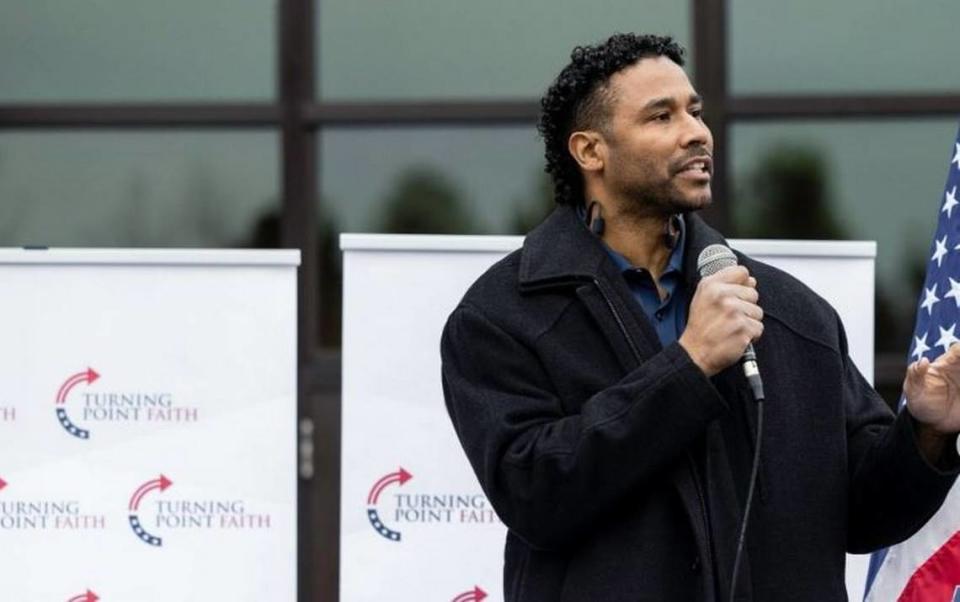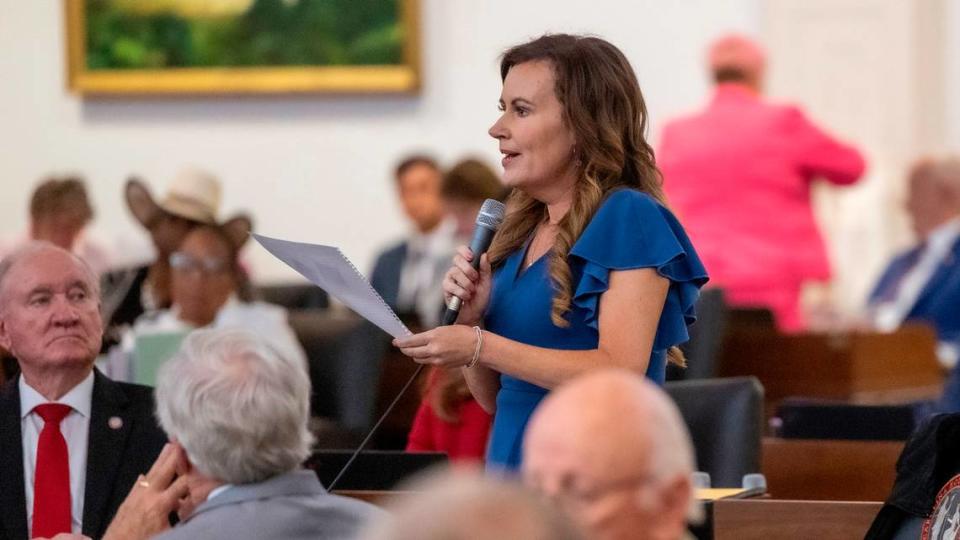NC county commissioner leaves Republican Party because it’s only ‘concerned with power’
- Oops!Something went wrong.Please try again later.
Cabarrus County Commissioner Kenny Wortman generated sharp criticism from the county’s Republican Party after he abruptly decided to leave the GOP.
Wortman, elected as a Republican commissioner in November, announced this month in a 19-minute video posted to Facebook that he would switch his party affiliation to unaffiliated. He expressed displeasure with the local Republican leadership because it “does not have your best interests in mind” and suggested the party was only “concerned with power.”
Wortman concluded the video by saying he wouldn’t run for reelection once his four-year term expires in 2026.
The Cabarrus County GOP did not receive the move well, particularly Brian Echevarria, head of the county’s Republican Party.
During an Oct. 16 Board of Commissioners meeting, Echevarria called Wortman a “turncoat” and chided him for committing what he called “a betrayal of Republican voters” that left the county without an all-Republican commission for the first time since 1998, the Independent Tribune reported.

“Commissioner Wortman’s decision to step away from the Republican Party and the principles that unite us is a betrayal of Republican voters who trusted he would represent their conservative interests,” Echevarria said in prepared comments. “And yet now we’re faced with what our Founding Fathers would have called a turncoat. His departure from the Republican Party is a display of ingratitude and deceit never before seen in Cabarrus County.
A well-known North Carolina party-switcher
While Wortman’s decision to leave his political party for another might be historically uncommon for the county of 240,000 residents, it is not nearly the most high-profile or controversial one to occur in North Carolina this year.
In April, Tricia Cotham, a Democrat elected to the North Carolina House, joined the Republican Party and delivered the GOP a supermajority in the state. Her decision — one that shifted the balance of power in North Carolina — sent political ripples throughout the state and generated similar sentiments of betrayal among constituents.
North Carolina has seen politicians switch before Cotham, too. And often for vastly different reasons.
Then-U.S. Sen. Jesse Helms switched from Democrat to Republican in 1970 because he lost faith in the party. Former state Rep. Michael Decker in 2003 announced he would go from Republican to Democrat to support the election of then-House Speaker Jim Black, a Democrat. And Rep. Paul Tine of Kitty Hawk changed his political affiliation from Democrat to unaffiliated in 2015 so he “can get more done” for his district, he told The News & Observer then.
Since 1994, about 173 lawmakers throughout the United States have changed political affiliation, according to Ballotpedia, a nonpartisan online record documenting the country’s politics.
Political support not guaranteed after change
Does switching parties or affiliations offer any advantages for people like Cotham and Wortman, who make the jump in the era of tribal politics?
No, says Chris Cooper, a political science professor at Western Carolina University.
Elected officials who switch parties motivated by sheer power grabs or ideological fits are often treated as outcasts by the group they left and are not entirely backed by the one they joined, he said.

Cooper cited the circumstance of then-Transylvania County commissioners Page Lemel and Mike Hawkins, who left the Republican Party in 2019 to be unaffiliated. They were unseated in the 2020 Board of Commissioners elections by both Republican and Democrat challengers.
Cotham or other candidates who decided to change parties could face a similar fate, Cooper said.
“It’s going to be extremely difficult when Tricia Cotham runs for office,” Cooper told The Charlotte Observer. “She has taken positions in the past that are far to the left of the average Republican. And she’s not going to get Democrat votes because she is a Republican now. But it may be difficult for her to get out of a Republican primary given the position she’s taken in the past. Hers is a really interesting case.”
As for Wortman, choosing the unaffiliated route might seem like an astute political strategy, considering there are 57,227 registered unaffiliated voters in Cabarrus County compared to 50,958 Republicans in the electorate, according to the most recent figures from the North Carolina State Board of Elections.
However, history shows it is difficult for candidates to win voter support if not affiliated with one of the two major political parties, Cooper said.
“Cabarrus is a changing county and trending away from the Republican Party. So from that perspective, maybe it makes some sense,” he said. “On the other hand, unaffiliated is just a tough position to run from, even as an incumbent.”
Though Wortman is not seeking a second term in office, unaffiliated candidates face challenges not being connected to a political party network; they often need to petition to get on the ballot and risk being shut out of debates.
“There are not many unaffiliated candidates who run for office, and when they do run, they tend to lose,” Cooper said.
Want more coverage of Charlotte-area government and politics? Subscribe here for free to the Observer’s weekly CLT Politics newsletter and never miss a story

